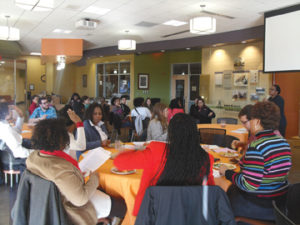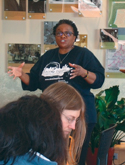
On January 19, 2014, renowned human rights activist Nontombi Naomi Tutu led a Sunday dinner workshop, “Honest Conversations on Race and Racism,” in the Carter G. Woodson Center. Tutu is the third child of Archbishop Desmond and Nomalizo Leah Tutu, and a 1983 graduate of Berea College. She has taught at the Universities of Hartford and Connecticut and Brevard College in North Carolina, and is now working as Program Coordinator for Race Relations Institute at Fisk University.
During the workshop, students were asked to read one of two versions of a brief story, then used them to explore how stereotypes based on race can influence even close relationships. One version of the story was labeled “Naomi,” and the other, “Rose,” and each presented sides of a heated conversation the two friends had concerning Rose’s intended compliment: “I don’t think of you as a black person.”
Students who read Rose’s perspective were asked to find a participant who had read the “Naomi” version and role-play together from the two different perspectives. Tutu guided the groups through an exploration of the discoveries made based on each set of expectations.
At first, several participants claimed they found it hard to relate to Rose’s point of view, especially since many of them had not grown up with the perspective of white privilege as Rose had. Later, many students admitted that at earlier points in their lives, they would have taken Rose’s remark as a compliment, and all in attendance explored what this meant
about the pressures on racial behavior in society.

Tutu helped the participants see the mistake that “Roses” make in such situations is leaving the negative baggage attached to their friend’s race, and assuming that whiteness is the standard against which we should measure someone’s worth, even though no overt racism is intended. Through this exploration, participants discovered various ways in which covert racism was still very much alive in various cultures, with a focus on the United States, and methods which we can use, whether a “Rose” or a “Naomi,” to approach another with understanding and compassion for different perspectives.

